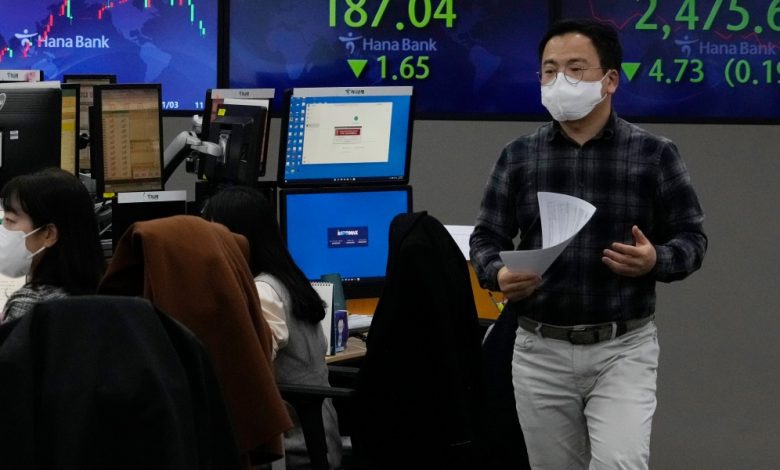Investors nervous about the Polish missile are sending Asian markets down and Europe up

European equity benchmarks were mostly higher in early Wednesday trading after Asian equities across the board ended lower.
Investors were nervous about global risks after Poland said a Russian-made missile killed two people there.
France’s CAC 40 rose 0.1% to 6,650.25 in early trade, while Germany’s DAX fell nearly 0.2% to 14,354.27. Britain’s FTSE 100 was up 0.3% to 7,388.77.
US stocks were expected to drift higher, with Dow futures up 0.3% to 33,712.00. S&P 500 futures were up 0.3% to 4,012.50.
Benchmarks fell in Sydney, Seoul, Hong Kong and Shanghai, while stocks in Tokyo ended slightly higher. Oil prices fell.
Details of the missile were unclear, including who fired it. Three US officials said preliminary assessments indicated the missile was fired by Ukrainian forces at an incoming Russian missile. The Polish government said it was checking. US President Joe Biden, who was in Indonesia for the G20 summit, promised “full US support and assistance in Poland’s investigation”.
Japan’s benchmark Nikkei 225 rose 0.1% to 28,028.30. Australia’s S&P/ASX 200 slipped 0.3% to 7,122.20. South Korea’s Kospi slipped 0.1% to 2,477.45. Hong Kong’s Hang Seng fell 0.5% to 18,256.48, while the Shanghai Composite fell 0.5% to 3,119.98.
“Asian equities were defensive on Wednesday, with geopolitical tensions driving price action,” said ActivTrades’ Anderson Alves.
“Traders are awaiting further developments on the geopolitical front to set the direction for risk assets. Any signal of escalation in the volatile situation could trigger a reaction on all markets,” he said.
Japan’s Cabinet Office reported that seasonally adjusted core machinery orders fell 4.6% mom in September. Private sector orders data excluding ship and power plant orders, which are closely watched as a leading indicator of business investment, fell 5.8% mom in August.
Treasury yields fell on hopes that a slowdown in inflation could mean the Federal Reserve’s bitter, economy-damaging medicine could also ease up.
“Inflation is still front and center and moving the market,” said Nate Thooft, senior portfolio manager at Manulife Investment Management. “Anything that could potentially shake the inflationary story, the market is eager to respond.”
Such sharp swings in equities have become almost the norm on Wall Street this year, as high inflation and the US Federal Reserve’s rate hikes have heightened fears and prompted knee-jerk reactions. “The market remains helpless, looking for a good narrative that will last, but can’t seem to find it,” Thooft said.
Traders have reduced bets on how big the rate hike the Fed will announce at its next monetary policy meeting in December.
The Fed already raised its federal funds rate from virtually zero to a range of 3.75% to 4% earlier this year. More is planned, but the hope for markets is that improvements in inflation data could mean the Fed keeps rates at levels that aren’t as punitive to Wall Street.
Crude oil prices fell back after the previous day’s jump. A deepening war in Ukraine could lead to price spikes for oil, gas and other commodities produced in the region.
In energy trading, the US crude index fell 38 cents to $86.54 a barrel. Brent crude, the international standard, fell 19 cents to $93.67 a barrel.
In forex trading, the US dollar rose to 139.39 yen from 139.27 yen. The euro cost $1.0402 versus $1.0349.
Sign up for the Fortune Features Email list so you don’t miss our biggest features, exclusive interviews and investigations.



